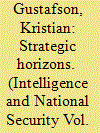|
|
|
Sort Order |
|
|
|
Items / Page
|
|
|
|
|
|
|
| Srl | Item |
| 1 |
ID:
158977


|
|
|
|
|
| Summary/Abstract |
The rhino is going extinct due to poaching at a rate which far outstrips current law enforcement or conservation efforts to halt their decline. A critical aspect of counter-poaching failures to date is an inaccurate view of the nature of poaching as a crime. Rather than demand-side efforts, attacking elusive smuggling networks or expensive technical solutions like drones, this article notes how a quasi-military tactical approach of ‘combat tracking’ offers the best way to protect the species. Based on wide ranging interviews and fieldwork across dozens of parks in southern Africa, it demonstrates how the current restricted range of the rhino, and the rarity of skilled poachers, makes a tactical solution the most effective to date.
|
|
|
|
|
|
|
|
|
|
|
|
|
|
|
|
| 2 |
ID:
094069


|
|
|
|
|
| Publication |
2010.
|
| Summary/Abstract |
Globalisation has blurred the lines between criminal, terrorist and insurgent networks. This interlinkage requires joined-up thinking but current initiatives have not fully appreciated the new logic. A comprehensively integrated approach is needed that recognises the essential connection between domestic and foreign threats, and the 'five blocks' of risk.
|
|
|
|
|
|
|
|
|
|
|
|
|
|
|
|
| 3 |
ID:
164198


|
|
|
|
|
| Summary/Abstract |
The role of Soviet and Cuban covert activities in Allende’s Chile has not been given sufficient consideration. This paper outlines the significant actions that the KGB and the Cuban DGI undertook there, showing that both organizations played important roles in both operating directly against the CIA and by supporting local actors. The results of their efforts, however, may have been negative to Allende’s coalition by focusing on factional or ideological interests. A broad array of sources is brought together to shed light on this historical gap. The result is a new paradigm in which we can consider this dramatic period.
|
|
|
|
|
|
|
|
|
|
|
|
|
|
|
|
| 4 |
ID:
101124


|
|
|
|
|
| Publication |
2010.
|
| Summary/Abstract |
The article deals with the role and benefit added by the use of horizon scanning in intelligence analysis in the UK. It asserts that horizon scanning as a technique, while not entirely akin to the tradecraft of intelligence analysis, has much to contribute to its success. Specifically, is asserts that a horizon scanning function in the JIO and the Cabinet Office should be made permanent, as bureaucratic tumult in the wake of the 2010 SDSR have left the capability un-staffed, though still established. Within the UK intelligence community, such an organization may have positive roles to play in the processes of challenge, the setting of collection priorities, and overall long-term UK intelligence assessment at the national level.
|
|
|
|
|
|
|
|
|
|
|
|
|
|
|
|
| 5 |
ID:
155212


|
|
|
|
|
| Summary/Abstract |
This article examines the Brunel Iraq HUMINT Matrix exercise. The purpose of this approach to intelligence pedagogy is to get participants to think through and work out analytic methods, issues, and potential solutions from first principles and for themselves. Our strategy is to try and fuse training and education learning outcomes, so that students emerge with a technical competence in analytic methods, underpinned by a deeper understanding of the foundations and internal logic shaping those methods. The Iraq Matrix exercise seeks to unpack and examine the nuts and bolts of source evaluation, and to test alternative hypotheses with particular attention to the relationship between the quality of various sources and, the weight of judgements they can or cannot sustain. The ultimate goal is to encourage what is currently fashionably referred to as ‘reflexive practice’, whereby the practitioner reflects critically and self-critically upon how their task works and how they do it, then uses those insights to improve their workplace performance. But not all of our teaching is directed towards practitioners. For those whose aims are scholarly and academic, the aim is to give observers a more visceral understanding of the challenges of the intelligence task they intended to study. Here the intended reflexive practice goal is to encourage an empathy with the workaday challenges facing those in the business of intelligence analysis, and to discourage the observer’s temptation to make facile and simplistic judgements about processes or events.
|
|
|
|
|
|
|
|
|
|
|
|
|
|
|
|
|
|
|
|
|